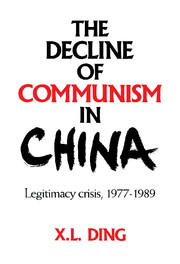Summary
In the spring of 1989, the world witnessed massive antigovernment demonstrations in major Chinese cities, followed by a military crackdown by the People's Liberation Army. Since then, a question raised again and again in scholarly circles has been: How could it be that under the Deng Xiaoping regime, when the People's Republic had experienced its greatest prosperity, there could occur the largest popular protest in the PRC's history?
In fact, it is not unique for a regime like the Chinese one under Deng to face popular protests. Since Tocqueville published The Old Regime and the French Revolution, scholars have been familiar with the paradox that unrest and revolutions break out more often when things go from bad to better than when they go from bad to worse. What the Deng regime experienced is but the latest example of the famous “Tocqueville effect” – the inability of a group in power to control change.
In the late 1970s, when Deng and his allies had just returned to office, the country was in a total crisis. Politically, major sectors of Chinese society still lived in the shadow of the great terror of Maoist “class struggle” campaigns. Economically, many peasants of even the once most prosperous rural areas had been reduced to beggars; and the urban population suffered from declining income and shortages of virtually all kinds of consumer goods.
- Type
- Chapter
- Information
- The Decline of Communism in ChinaLegitimacy Crisis, 1977–1989, pp. 1 - 6Publisher: Cambridge University PressPrint publication year: 1994



